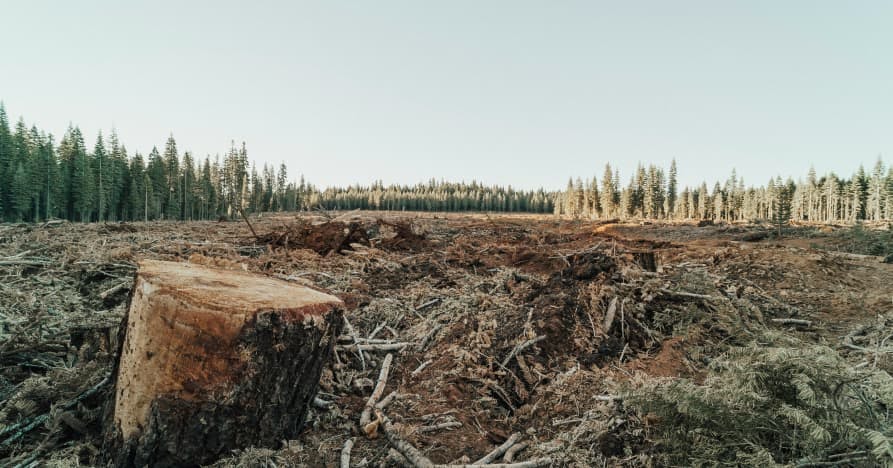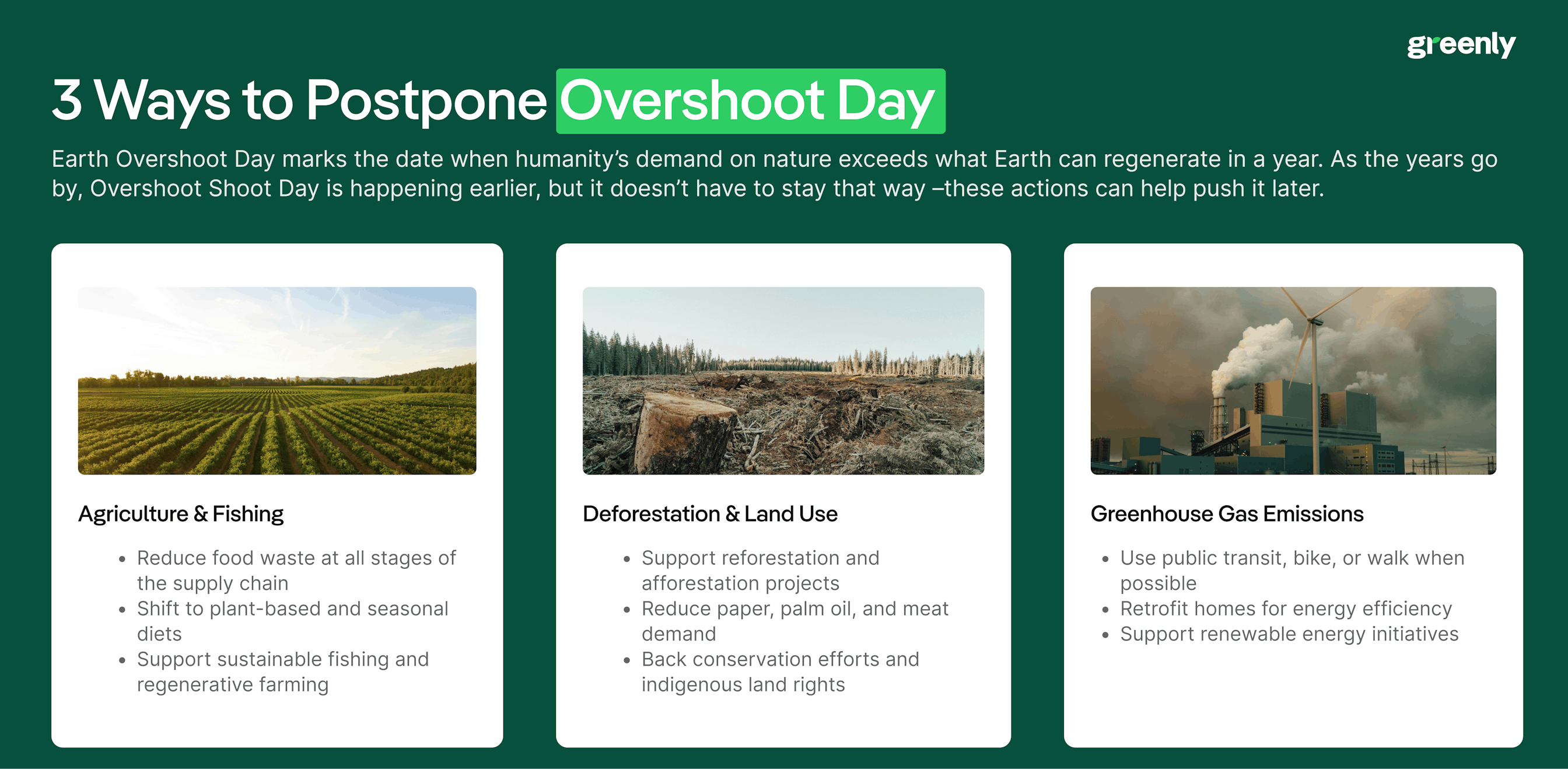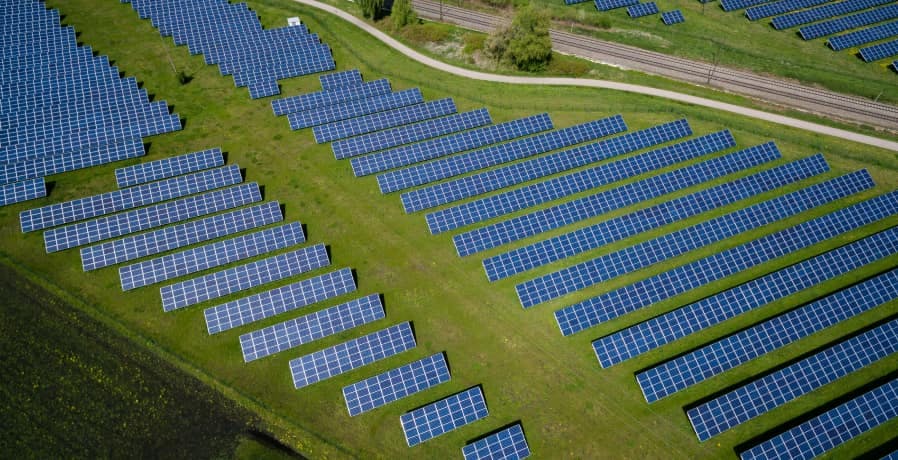ESG / CSR
Industries
Overshoot Day: What Does It Imply?



- What Earth Overshoot Day is
- How Overshoot Day is calculated and the factors that contribute to it
- Potential solutions to postpone Earth Overshoot Day
In 2025, Earth Overshoot Day 2025 will occur on July 24th, 2025 – roughly five months before the end of the year.
For reference, Earth Overshoot Day 2024 occurred on July 25th – demonstrating how Earth Overshoot Day date holds steady: for now, until future generations continue to contribute to biodiversity loss, soil erosion, and negatively impact our planet's ecosystems.
Overshoot Day is impossible to miss, as every year – the media announces this fateful date, and it draws closer each year due to continued frequent extreme weather events and humanity's ecological footprint.
At this point, you may be wondering what Earth Overshoot Day, or EOD is. Essentially, Overshoot Day is an indicator and testimony to the resource constraints and pressure created by mankind. Of course, global warming is depicted by the surplus of greenhouse gas (GHG) emissions released into the atmosphere – but it is also represented by the depletion of natural resources.
In this article, we'll explain what Overshoot Day is, the causes of this ecological deficit, and how we manage to finally push back this date.
What is Overshoot Day?
Overshoot Day symbolizes the date on which humanity has consumed all the resources that the planet can regenerate in one year. Some examples associated with overshoot day include how in one year, humanity catches so many fish – that the fish species don't have time to reproduce. Another example is when we cut trees faster than they can grow.
The overview cards below will provide various examples used to calculate how overshoot accumulates over time:
Therefore, Overshoot Day day perfectly demonstrates the pressure humans are putting on the planet – and depicts how our way of life is far too greedy to be sustained by the natural resources we have available.
Calculating Natural Resources on Earth Overshoot Day
On Overshoot Day, humanity is merely living off of credit – virtually the same way someone uses a credit card without having sufficient funds in their bank account. The same goes for humans on Overshoot Day: using resources that are otherwise unavailable.
The timeline below will reveal how humanity's demand for natural resources beyond Earth's means have impacted the planet, and how Earth Overshoot Day marks and calculates the use of these finite resources:
🌍 We Use More Than Earth Can Renew
Earth Overshoot Day marks the date when humanity’s demand for ecological resources exceeds what the planet can regenerate in a year.
🪵 Forests Are Being Depleted
Deforestation to make way for agriculture, logging, and development removes critical carbon sinks and destroys ecosystems faster than they can recover.
🐟 Oceans Are Overfished
Global seafood consumption outpaces the natural reproduction rate of marine species, leading to collapses in fish populations and damaged food chains.
🚜 Agriculture Uses Up Land and Water
Modern farming consumes massive amounts of arable land and freshwater, often leading to desertification, soil erosion, and biodiversity loss.
🏙️ Urban Growth Demands More Resources
Expanding cities increase energy consumption, concrete production, and infrastructure needs, placing greater strain on finite natural inputs.
📈 Overshoot Gets Earlier Every Year
Unless consumption slows or renewable solutions expand, Earth Overshoot Day will continue to creep earlier — showing we’re living deeper in ecological debt.
When Was the First Earth Overshoot Day?
Earth Overshoot Day was first introduced in 2006 by the Global Footprint Network, but he concept of measuring the capacity and consequential strain of our ecological resources started long before Earth Overshoot Day came into play.
In fact, the first calculated Earth Overshoot Day was on December 19, 1987 – but for the past almost 40 years, the date has continued to move earlier in the year, marking our unprecedented and unsustainable rate of consumption.
The table below will reveal how Earth Overshoot Day has crept closer and closer to summer as the years have passed:
| Year | Overshoot Day | % of Year Remaining | 🌍 What Was Happening |
|---|---|---|---|
| 1970 | 🟢 December 29 | 0.8% | 🌍 Fewer industrialised countries, minimal global footprint |
| 1980 | 🟢 November 3 | 16.2% | 📺 Consumer culture explodes, plastic revolution |
| 1990 | 🟡 October 11 | 22.5% | 🚗 Globalisation, suburban sprawl, rise of car culture |
| 2000 | 🟠 September 23 | 27.4% | 💻 Start of internet age, digital acceleration |
| 2010 | 🟠 August 8 | 40.0% | 👗 Fast fashion, tech overconsumption spike |
| 2015 | 🔴 August 6 | 40.5% | 📦 Amazon culture: one-click shopping, more packaging waste |
| 2018 | 🔴 August 1 | 41.9% | 🔥 Climate awareness rises—but consumption still dominates |
All of this information regarding the amount of ecological resources Earth is able to generate can beg the question – have we never noticed the net decrease of our ecosystems? Regardless of whether or not mankind takes accountability to acknowledge it, the depletion of resources has been noticeable since the industrial revolution that took place in the 19th century, but has dramatically worsened over the last 50 years.
Essentially, if we didn't over consume the planet's resources, the Overshoot Day wouldn't even exist – the same way that if people didn't spend money they didn't have, no one would ever go into debt.
Overshoot Day will continue to prove prominent and relevant, as the forecasts are far from good – seeing as by 2050, humanity will "require" twice as many natural resources to meet its needs in comparison to 2020. The availability of these resources by then is looking more sparse by the day.

How is Overshoot Day Calculated?
Every year, the American NGO Global Footprint Network uses more than 3 million pieces of statistical data, spanning around 200 countries, to calculate Overshoot Day. After this is data collection has been completed, Overshoot Day can then be calculated by dividing the Earth's biocapacity by the average ecological footprint created – and then by multiplying this result by 365, or how many days are in a year.
The main goal of Overshoot Day is to raise awareness regarding the limited availability and regeneration of our natural resources, and to encourage humanity to measure the impact of its consumption on our ecosystems.
Breakdown: How Earth Overshoot Day is Calculated
In case that didn't make sense, let's break it down further:
Calculating Overshoot Day isn't all that complicated. In fact, all that is needed to calculate Overshoot Day is to divide humanity's ecological footprint, or their annual consumption of ecological resources, by the planet's biocapacity – or the amount of resources that can be regenerated, as well as the amount of waste that can be absorbed in a year.
The vertical timeline below will visually depict the steps to how Earth Overshoot Day is calculated:
-
1. Measure Biocapacity 🌱
Calculate how much biological productivity (forests, oceans, croplands) Earth can regenerate in one year. -
2. Measure Ecological Footprint 👣
Calculate total global human demand for resources: food, timber, carbon absorption, etc. -
3. Divide Earth's Biocapacity by Footprint ➗
Biocapacity ÷ Ecological Footprint = % of year Earth can meet demand sustainably. -
4. Multiply by 365 📅
Multiply the result by 365 to find the date when demand exceeds nature’s annual budget. -
5. Mark the Date 📍
This date is declared as Earth Overshoot Day for that year. -
6. Track the Trend 📉
Each year, organisations like Global Footprint Network compare changes to show whether we’re moving the date back or forward.
Using all this data, the American NGO also estimated the number of planets that would be needed to compensate for our excessive consumption of resources – and they found out in 2022 that we would need 1.75 Earths to meet our current level of consumption. This is equivalent to 74% more resources than what our ecosystems currently provide.

What's Causing Overshoot Day to Be So Early?
There are several reasons why Overshoot Day continues to arrive earlier every year, such as increased greenhouse gas emissions created by human activity, more intensive agricultural practices, excess fishing, and deforestation.
As humans continue to engage in excessive and carbon intensive activities, Overshoot Day is likely to continue arriving closer and closer each year.
Here are some of the reasons why Overshoot Day arrives earlier each year:
Intensive Agriculture and Fishing Practices
Half of the Earth's biocapacity is used to feed us, and therefore – as our global human population continues to skyrocket, these resources will become even more sparse. In fact, according to the United Nations by 2100, there could be 11.2 billion people living on Earth – proving how we need to curate more sustainable patterns today.
Intensive agriculture and fishing practices contribute to:
- Using too many resources, such as animals, but also natural resources – since agriculture consumes 70% of drinking water worldwide;
- Excessive use of fossil fuels;
- Contributes to deforestation, soil destruction, biodiversity depletion, marine ecosystem imbalance and atmospheric pollution.
Lastly, these two modes of production lead to the depletion of biological resources. Therefore, over exploitation must give way to sustainable agriculture and fishing that is more respectful of the environment.
The summary cards below will break down how agriculture and fishing practices alike impact the planet, as well as provide potential solutions to make each one more sustainable:
Industrial Agriculture
High pesticide and fertiliser use leads to soil degradation and water pollution. Encouraging crop rotation, organic methods, and regenerative farming can help restore ecosystems and reduce emissions.
Overfishing
Excessive harvesting disrupts marine food chains and depletes fish stocks. Implementing quotas, marine protected areas, and sustainable seafood certifications are key to restoring ocean health.
Livestock Farming
Livestock emits large amounts of methane and requires massive land and water. Solutions include reducing meat consumption, improving animal feed, and supporting alternative proteins.
Aquaculture
Fish farms can cause pollution and harm wild populations. Sustainable practices like closed-loop systems, native species farming, and reduced antibiotic use can mitigate these risks.
Ultimately, the WWF suggests slashing meat consumption in half, to push back the excessive fishing by 17 days, and to decrease global food waste by 50% worldwide to help push back this same date by 13 days.

Deforestation
The loss of global forest biocapacity has a direct impact on global warming. By cutting down trees, humanity is robbing the planet of its natural carbon sinks.
Remember, while trees absorb a portion of CO₂ throughout their lifetime – once they've been cut down, they release all of the carbon dioxide emissions they've accumulated directly into the atmosphere. This further compromises our already questionable air quality and further impacts our already existing air pollution crisis.
Furthermore, deforestation impacts biodiversity, reduces the supply of food and raw materials, prevents the regulation of the water cycle, impacts our quality of life, and more.
The drop down sections below will break down how cutting trees and continued deforestation are bad for the planet:
Did you know that every year, 10 million hectares (100,000 km²) of forest are destroyed, threatening millions of animal and plant species?
Ultimately, forest conservation must be a priority. That's why WWF wants to reforest 350 million hectares of forests to help postpone Overshoot Day by eight days.
The flip cards below will reveal additional potential solutions to help reduce the impact of deforestation and postpone Overshoot day:
Greenhouse Gas Emissions (GHG)
We generate more emissions than the earth's natural carbon sinks are able to absorb in a year. These natural carbon sinks mostly consist of forests and oceans.
As a result, according to "Earth Overshoot Day," the carbon footprint for Overshoot Day in 2023 represented 61% of humanity's ecological footprint.
Evidently, since the industrial revolution – our GHG emissions have been steadily accumulating in the atmosphere. Unsurprisingly, human activities, such as the extraction, burning and use of fossil fuels, emit a large portion of these greenhouse gases.
The summary cards below will reveal how various human activities such as the growth of technology, use of fossil fuels, and travel have contributed to rising levels of GHG emissions:
Climate Change & Earth Overshoot Day
Each year, when Earth Overshoot Day falls earlier in the year, it reveals the need to explore solutions in key areas contributing to climate change in order to ensure that our way of life doesn't impact future generations.
However, we may have already passed the point of no return. In 2021, CO₂ emissions reached 36.4 billion tons. Only two years later, in 2023, CO₂ emissions reached 37.4 billion tons of carbon dioxide emissions – an all time high for the planet.
Beyond accelerating global warming, the industry also contributes to the depletion of natural resources. For example, fossil fuel reserves are melting away.
As of 2020, there are only:
of coal reserves remaining
of natural gas reserves remaining
of oil reserves remaining
In order to rectify the amount of emissions contributing to Overshoot Day, the WWF recommends reducing humanity's carbon footprint by 50% to push back Overshoot Day by 93 days – equivalent to three months.

How Can We Postpone Overshoot Day?
The best way to postpone Overshoot Day is to reduce the consumption of natural resources, which involves slowing down our current economic model. Therefore, we need to transition from the use of an unsustainable model of over consumption to a sustainable model – which is a circular economy.
Essentially, the best way to ensure Overshoot Day is postponed every year would be to encourage our society to make do with less – and to vouch for the infamous saying, "less is more" – because in terms of Overshoot Day, it is!
Postponing Overshoot Day is possible by protecting the environment while ensuring the well-being of individuals relies on sustainable production, reasoned consumption and efficient waste management.
This may seem like an overwhelming agenda, but there are several ways to approach delaying Overshoot Day. The interactive flip cards (move cursor over card to flip) will reveal some of the ways we can accomplish this, such as by:
Protecting Natural Carbon Sinks
The ocean absorbs 30% of our carbon emissions, making it the most important carbon sink in the world – but it is obviously not the only one.
Several actions can be taken to safeguard our natural carbon sinks:
Preserve Carbon Sinks
Preserve existing carbon sinks and create artificial sinks through new technologies.Restore Degraded Forests
Restore forests that have been over exploited (those converted to cattle ranching, for example).Reforest Tropical Areas
Reforesting tropical forests (which capture more CO₂ and act as a barrier to floods and hurricanes in coastal urban areas in the tropics and sub-tropics).Protect Oceans
Fighting ocean acidification through sustainable fishing.Decarbonizing the Economy
With a goal in mind to limit global temperature from exceeding 2°C by the end of the century and achieving carbon neutrality by 2050 – decarbonizing the economy seems inevitable, but there are approachable ways for all of us to successfully work towards this goal.
For instance, switching to the use of renewable energies is one of the best ways to limit rising worldwide temperatures. This is one of the objectives set by the United Nations. Thus, the share of renewable energy in the global energy mix should be increased by 2030.
In addition to this, we must find a way to move forward in society without the use of fossil fuels, especially in our production processes – as this remains one of the most detrimental components to Overshoot Day and global warming as a whole.



Additional Ways to Explore Solutions to Postpone Overshoot Day
There are additional mechanisms that we can implement in society to postpone overshoot day – both of which would help the planet and be financially advantageous.
The drop down sections will reveal even more ways that we could postpone overshoot day:
Overall, Overshoot Day is a reminder of how we are treating the planet – and it still isn't too late to turn it all around. We can all make a difference, whether in our daily lives or as a cog in the machine of a big company, to delay Overshoot Day and protect our planet from the negative effects of global warming.
What About Greenly?
If reading this article about Overshoot Day has made you interested in reducing your carbon emissions to further fight against climate change – Greenly can help you!
At Greenly we can help you to assess your company’s carbon footprint, and then give you the tools you need to cut down on emissions. We offer a free demo for you to better understand our platform and all that it has to offer – including assistance with boosting supplier engagement, personalised assistance, and new ways to involve your employees.
Click here to learn more about Greenly and how we can help you reduce your carbon footprint.




